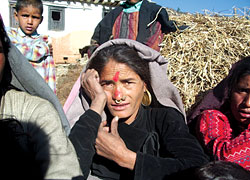|
|
JUMLA-Once you get to remote northwestern Nepal, all the statistics you hear in Kathmandu about improvements in public health no longer make any sense.
This is the part of Nepal where the child mortality rate is up to four times higher than the national average. Four out of every 10 babies born die before their first birthday. And they die of simple lung infections, dehydration from dysentery or of vaccine-preventable diseases like measles.
There are supposed to be improvements, of course, but one wouldn't know it here in the dalit settlements in Sigachaur outside Jumla's district capital, where local women gathered recently for one of those periodic health camps that are supposed to compensate for the lack of a proper government health service.
The children are beginning to go to school, and solar-powered lights have improved their health because they don't have to study by the light of sooty kerosene lamps anymore. Incomes have risen because of micro-credit schemes aimed at dalit women. Yet Jumla still has one of the shortest average lifespans for men and women in Nepal.
A hidden problem is the high number of women suffering from a prolapsed uterus. Of one group of 22 women in the health camp, only two didn't have this condition. They don't normally talk about it, much less seek medical help. This is no doubt because of the women's prescribed roles, subjugation, illiteracy and, of course, the absence of state health services and outreach in the district.
Lal Maya Sunuwar (above), 35, had a miscarriage two years ago. She was lucky to survive after being discovered lying in a pool of blood in the forest where she had gone to collect firewood. She bled continuously for six more months and now lives with a prolapsed uterus.
Laxmi Sunuwar is 25 and by nature vivacious and independent. She has three boys and is now pregnant with a fourth baby she doesn't want because she knows she won't be able to care for it properly. Fourteen-year-old Sumitra is the daughter of now-widowed Nili. She eloped recently and is four months pregnant. Nili is worried sick about what may happen to her daughter at childbirth.
A daughter-in-law in Jumla is still judged by how soon after childbirth she goes to fetch firewood and fodder. But Nili seems powerless to ensure that her daughter delivers in a health centre and takes the necessary rest and post-natal precautions - if she survives the ordeal at all.
People here, especially the women, look twice their real age, exhausted by the harsh climate, rugged life and chronic hunger. Almost every women here has a reproductive health ailment, and because it is a woman's problem they don't talk about it. They don't go to hospital because the doctor, if there is one, is usually a man. The men start drinking and gambling well before the sun sets while the women huddle indoors around the smokey kitchen fire.
Despite decades of development interventions and rampant rhetoric about the liberation of women, the condition of Jumla's most underprivileged women has not improved, and maybe even worsened. Genderspeak and the work of specialists don't mean much to the women here because their analysis is not grounded in compassion.
The responsibility to ensure basic human rights and justice for the women of Jumla lies with those who wield most power and those who are supposed to be entrusted with improving their lives. Yet here, in the midst of western Nepal's stark beauty, cultural heritage and diversity, there is a grinding, hopeless poverty and dependence.
Any thinking visitor to the Karnali region returns angry: outraged by the apathy and neglect of the central government in Kathmandu to the desperate need for the simple things that could improve women\'s lives here. It is time to convert that anger into individual action and organise long-term sustainable help for Jumla's health.




